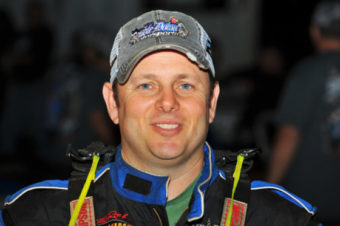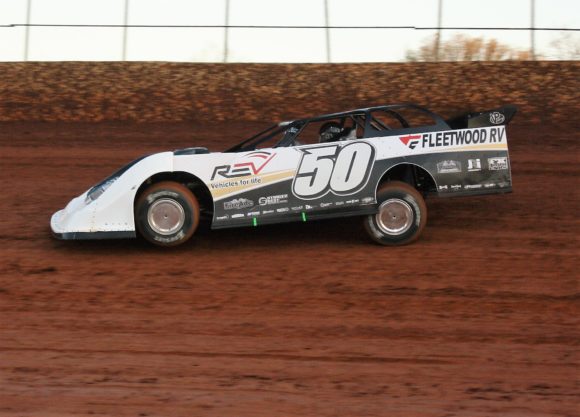This website recently published the story that announced the decision by Knoxville, Tenn. racer Mark Douglas to shut down his racing operation and sell all of his equipment. In the aftermath of that story, there were posts made to Facebook, Twitter, and message boards by fans who laid the blame for the recent number of local and regional drivers who have made similar decisions at the feet of the two national Dirt Late Model touring series.
The argument made by some is that the Lucas Oil Late Model Dirt Series and the World of Outlaws Late Models have enacted a set of rules that favor their regular competitors and make it both difficult and expensive for those who do not follow those tours on a full-time basis to compete on those select weekends when they have an opportunity.
As a result of those comments, InsideDirtRacing.com asked two regional racers if there are indeed issues brought about by the national tours that make it difficult or impossible to join in when those series come to their area.
Shanon Buckingham drives for the Roger Sellers-owned Double Down Motorsports team that races around the east Tennessee region, including with the two national series on occasion. The No. 50 car started from the pole after winning a heat race for the Lucas Oil race recently contested at Kentucky’s Florence Speedway. The next day, Buckingham finished fourth in the LOLMDS event held at the Tazewell(TN) Speedway.
“I think unfortunately that it’s just part of it,” Buckingham declared when asked about the escalating costs involved with racing. “I think the safety stuff needed to be put in place. Maybe they could have made it a little more gradual, but it’s hard to put a value on somebody getting hurt. I think when it comes to cost, I like Randy Weaver’s ideas and some others, and that is if you could slow the cars down a little bit and maybe change the body rules a little you could take away the need for the expensive motors and the exotic parts. But I think it’s just the nature of the animal. If you start a stick horse racing league eventually somebody’s going to get a titanium stick horse. I don’t know if you can stop that once the snowball starts to build.”
Buckingham’s experience with rule changes that are sometimes enacted with the idea of reducing costs has been that they actually work in the opposite way from the original intent.
“Sometimes rules just cost a lot of money,” the Morristown, Tenn. racer explained. “Everybody would love to see it made more affordable. I don’t know, it’s just changing and it’s not like it used to be when you had the big weekly car counts at local tracks. It’s become more of a national thing and if you’re going to go run nationally you’ve got to have deep pockets to get into this technology.”
And Buckingham says that the answers are not as easy to come up with as some would like to believe. But he added the need for someone to find those answers before it is too late.
“I don’t have the answers for that but they’ve got to figure it out or our racing will someday just turn into what NASCAR has,” he said. “And that’s based off so many rules.”
Buckingham fears that old fashioned hard work and creativity may have become a thing of the past in Dirt Late Model racing. Instead, high tech pieces and parts have overrun that method of doing things, and the evolution of this sport has led to more expense.
“What this sport is about to me is being able to lay on the floor in the shop and come up with stuff then trying to outwork the next guy,” Buckingham said. “That’s the way I perceive it. If you put the time and effort into it you can outdo a guy. But it seems like every season it’s become more about the money than it is the hard work.”
Casey Roberts drives for a regional operation owned by Jimmy and Anne Cushman that races successfully in the various regional series that sanction races near his Georgia home as well as with the national tours when they visit his part of the country. Roberts has won regional championships as well as feature races while competing with the national tours. He recently finished fourth in the WoO Late Models event held at Smoky Mountain Speedway.
“I don’t know if it’s so much the rules or if the technology just got so out of hand,” Roberts answered when asked if there were any rule changes that could help drivers such as himself. “I don’t know, if you could limit one shock and spring per corner or really what the right way of going about it is.”
According to Roberts, the improvements in technology bring about added and often unforeseen costs of another kind.
“You’ve about got to have so much hired help,” he pointed out. “And it’s got to be the right kind of hired help, the engineers, shock guys, and stuff like that. If you don’t have somebody that’s real educated on your side it seems like you’re behind the eight ball for sure. It’s hard enough nowadays to win a local show or a regional show, it’s tough. On the national tours it’s just that much tougher. It makes it hard on guys like myself to compete with those guys that have unlimited funds and unlimited help. Those guys can go out testing three or four days a week instead of working a regular job, but we still like to come out and race with them when we can. Sometimes we do all right. But if we don’t, we don’t have anything to hang our heads about.”
Roberts has empathy for the rule makers at the national and regional levels. Their job is one he does not covet.
“When you put yourself in their shoes, it’s hard to come up with the right amount of rules to regulate everything,” he explained. “It’s easy for the guys on the other side of the fence to point fingers at them but they’ve got to do what they think is right. I know it’s tough to try to write a rule book nowadays because there’s so many loopholes around things. Guys will find ways to not necessarily cheat but to bend the rules a little bit. But that’s what makes you fast. It’s getting out of hand, but I don’t really know what the right answer is to it.”
But Roberts and many other regional and national competitors do know one thing for sure.
“It’s still fun and I love it so we’ll just keep plugging away at it.”








